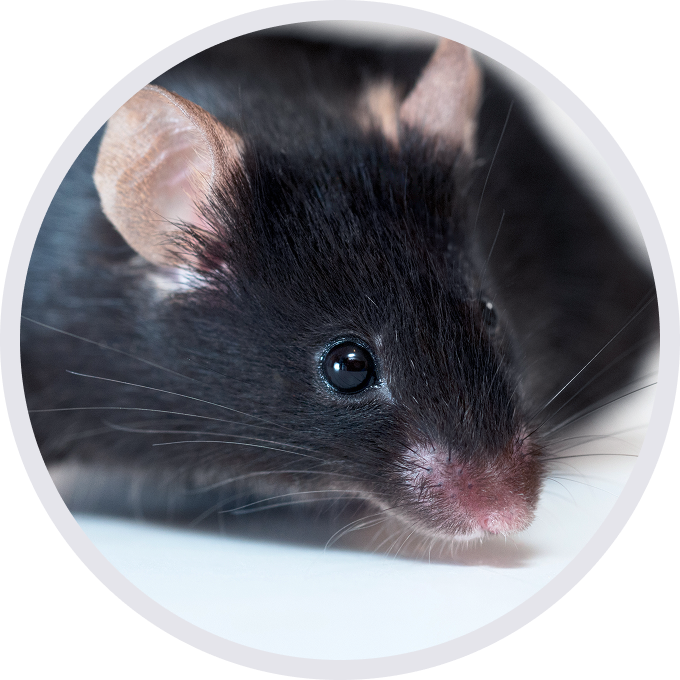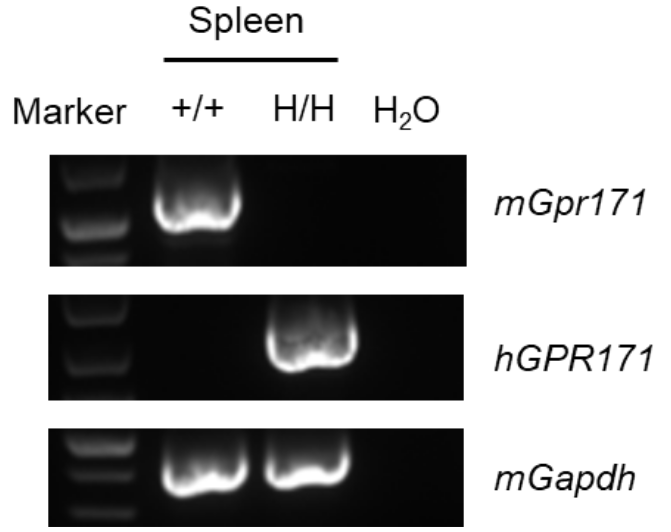
C57BL/6N-Gpr171tm1(GPR171)Bcgen/Bcgen • 112807
GPR171 is an orphan G protein-coupled receptor putatively related to the P2Y family of purinergic receptors (P2YRs) for extracellular nucleotides, a group of mediators previously shown to regulate hematopoietic progenitor cells (HPCs) .
GPR171 contains seven transmembrane domains, an extracellular N-terminus and an intracellular C-terminal tail. Its detailed structure and ligand binding domain structure was predicted by homology modeling based on its similarity to P2Y12 receptor.
GPR171 is a potential target for drug development in obesity and weight problems, anxiety, various psychiatric disorders and pain.
Western blot analysis of GPR171 protein expression in homozygous B-hGPR171 mice. Various tissue lysates were collected from wild-type C57BL/6N mice (+/+) and homozygous B-hGPR171 mice (H/H), and then analyzed by western blot with anti-GPR171 antibody (Alomone labs, AGR-054). 40 μg total proteins were loaded for western blotting analysis. GPR171 was detected in lung, spleen, stomach and bladder in wild-type mice and homozygous B-hGPR171 mice, as the antibody is cross-recognized between human and mouse GPR171.
Gene targeting strategy for B-hGPR171 mice. The exon 2 of mouse Gpr171 gene that encodes extracellular domain, transmembrane domain, cytoplasmic region and 3’UTR is replaced by human counterparts in B-hGPR171 mice. The promoter and 5’UTR region of the mouse gene are retained. The human GPR171 expression is driven by endogenous mouse Gpr171 promoter, while mouse Gpr171 gene transcription and translation will be disrupted.

Strain specific analysis of GPR171 mRNA expression in wild-type C57BL/6N mice and B-hGPR171 mice by RT-PCR. Spleen RNA were isolated from wild-type C57BL/6N mice (+/+) and homozygous B-hGPR171 mice (H/H), then cDNA libraries were synthesized by reverse transcription, followed by PCR with mouse or human GPR171 primers. Mouse Gpr171 mRNA was detectable in wild-type mice. Human GPR171 mRNA was detectable only in homozygous B-hGPR171 mice (H/H) but not in wild-type mice.

Western blot analysis of GPR171 protein expression in homozygous B-hGPR171 mice. Various tissue lysates were collected from wild-type C57BL/6N mice (+/+) and homozygous B-hGPR171 mice (H/H), and then analyzed by western blot with anti-GPR171 antibody (Alomone labs, AGR-054). 40 μg total proteins were loaded for western blotting analysis. GPR171 was detected in lung, spleen, stomach and bladder in wild-type mice and homozygous B-hGPR171 mice, as the antibody is cross-recognized between human and mouse GPR171.